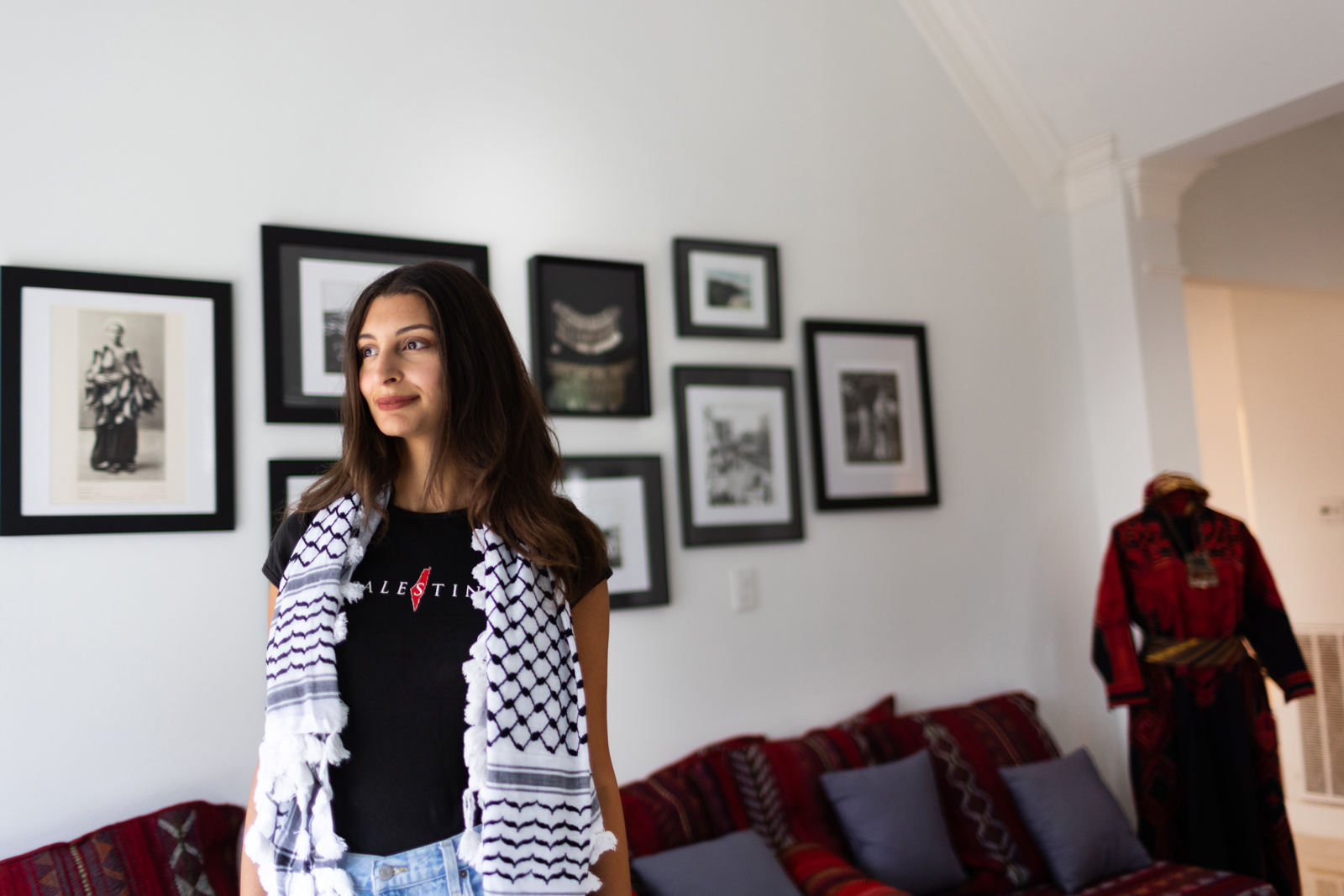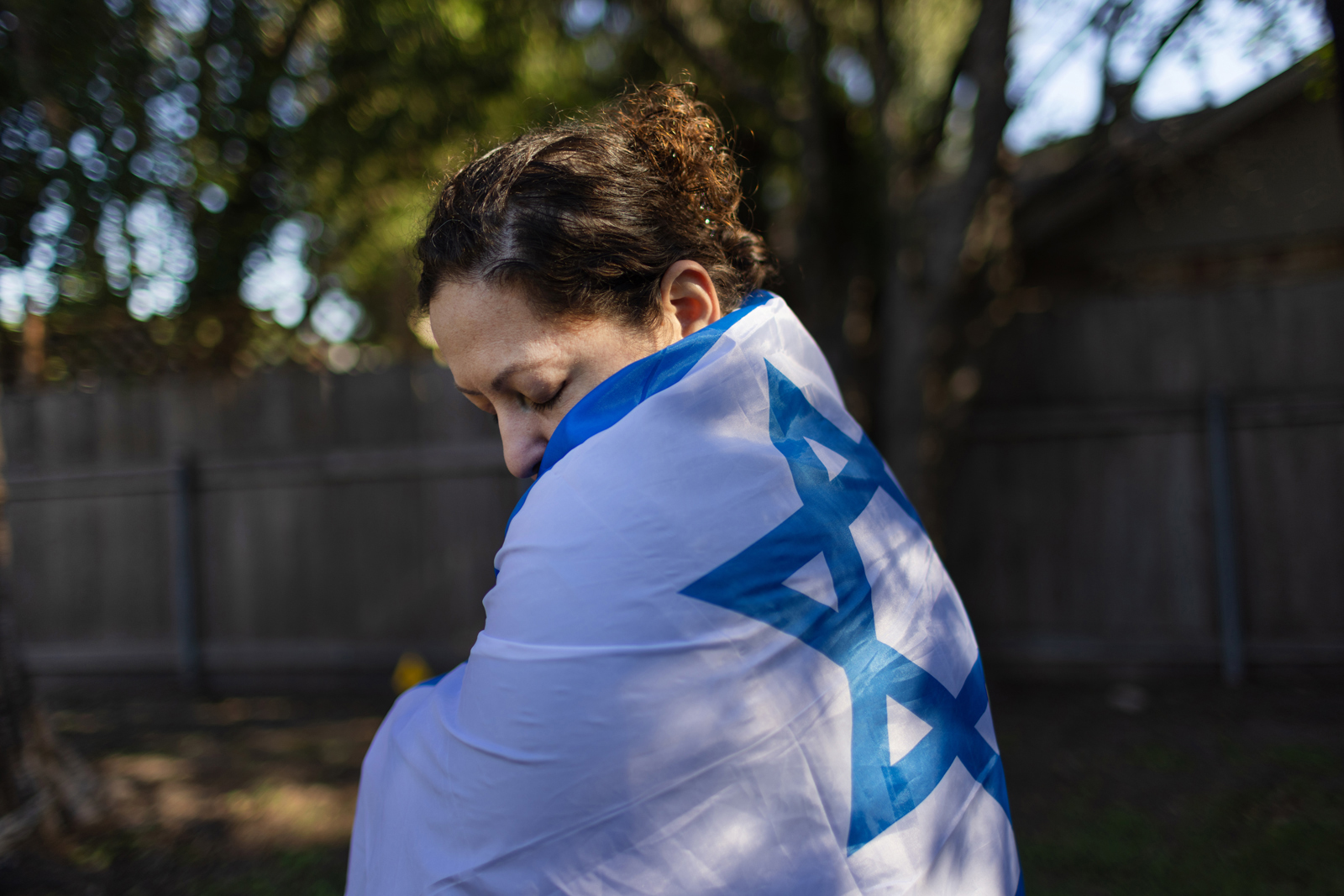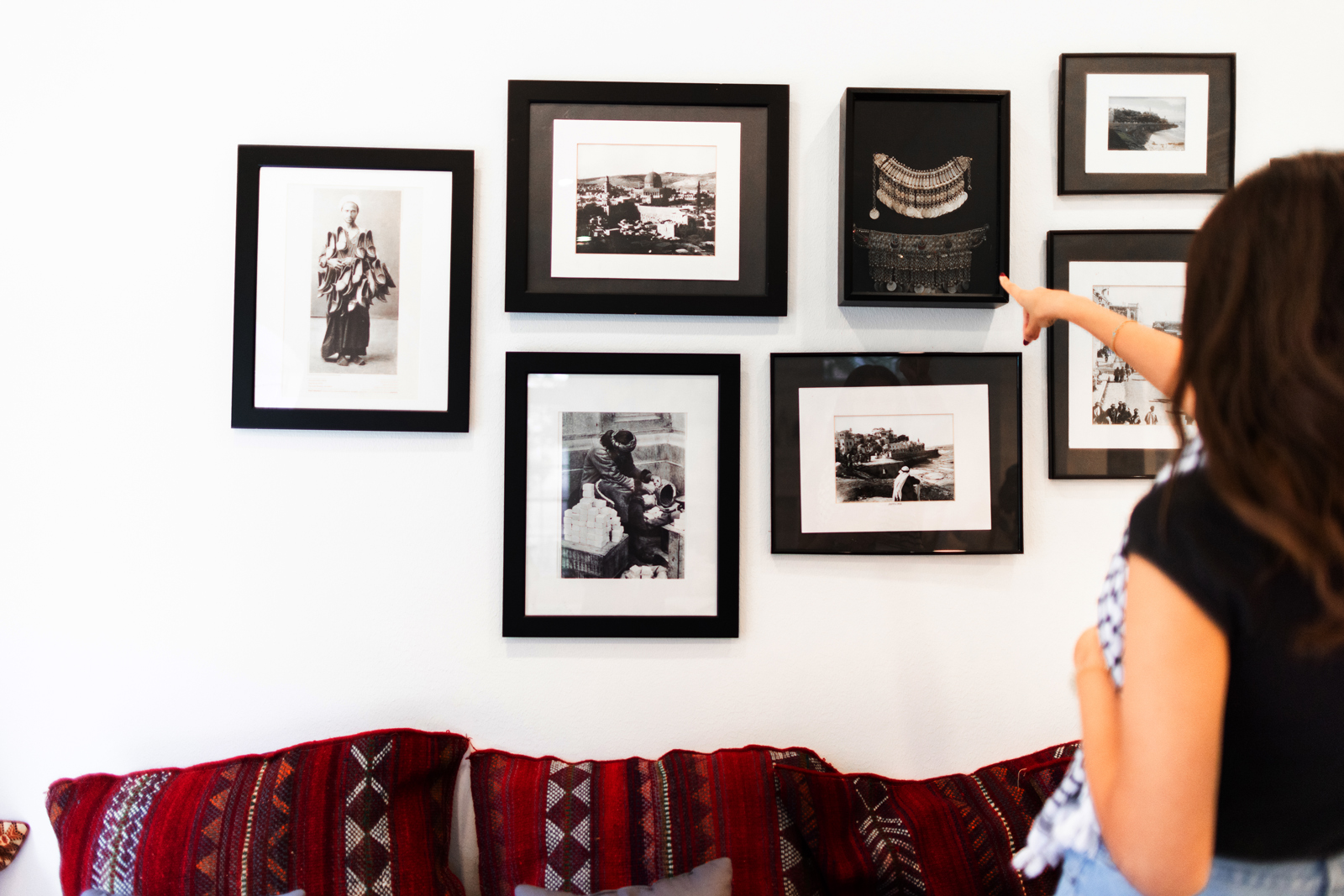|
Getting your Trinity Audio player ready...
|
Sleepless nights and constant dread.
As the world watches in horror, casualties continue to mount in the Middle East. Some Houstonians have struggled to cope with the slow trickle of information and vitriolic rhetoric around the reignition of Israel and Palestine’s near-endless hostilities.
Seven thousand miles away, the effects of war reach far beyond the battlefield, especially in a conflict where so many casualties are innocent bystanders. For immigrants from Israel and Palestine, that brings stomach-dropping fear with every new morsel of information coming out from Gaza.
In Harris County, almost 6,000 residents are of Israeli or Palestinian descent, according to the 2020 U.S. Census. Those with ethnic ties to the region aren’t the only residents struggling with the weight of the war. Within Houston’s metropolitan region, another 51,640 residents are Jewish, according to the American-Israel Cooperative Enterprise, a nonprofit dedicated to strengthening the U.S. and Israel’s relationship. While they may not be from Israel directly, conversation around the war has left Jewish Americans feeling like they do not belong.
The 2020 census was the first to specifically collect data on people of Middle Eastern and North African ethnicity. U.S. Arab population numbers, including those for Palestinians, are likely undercounted in part due to misunderstanding of government surveys and issues with write-in ancestry questions, according to the Arab American Institute. The 2020 U.S. Census shows that 4,014 Harris County residents claimed some form of Arab ethnicity.
That confusion is part of the Palestinian-American experience. The U.S. government does not recognize Palestine as its own country. The U.S. Department of Homeland Security’s 2021 Yearbook of Immigration Statistics puts Palestinian refugees and asylum-seekers under the “Unknown” category. However, the U.S. does recognize the Palestinian National Authority as representative of the Palestinian people.
Polarizing debates and the proliferation of misinformation has made the angst worse for helpless Houstonians as they anticipate updates from loved ones.
We spoke to a number of Houstonians directly impacted by the war — some who have lost family members and longtime friends — but have found solace through community and unifying pride in their identity.
Initial reaction
In the early morning of Oct. 7, Hamas, the Palestinian militant group controlling the Gaza Strip, shocked the world by launching thousands of missiles and sending forces into Israel. Israeli media reported the attacks killed at least 250 people and wounded 1,500. In retaliation, Israel Prime Minister Benjamin Netanyahu said the country was at war, and the Israel Defence Forces swiftly launched an operation, killing at least another 232 people and wounding 1,600, according to the Palestinian Health Ministry.

Shoshi Kaganovsky, a 38-year old Jewish entrepreneur and former IDF soldier who lives in Meyerland, was in “complete disbelief” when she heard the news. She had taken a short weekend getaway with her partner in the Texas Hill Country where she had spotty phone signal, only to return to an endless stream of messages from family and friends.
Kaganovsky: Your first instinct is to make sure that you and yours, technically your family and your first circle, is OK, they're alive. So that's what I started doing. I started checking out of those 2,000 messages, I scrolled through all those that were not out of Israel or not from my inner circle. Unfortunately, right there and then, some of the messages already included news about dead people. Children of my friends, nephews, parents, a Holocaust survivor that was shot to death in her face at zero range and all sorts of other types of evidence that you don't want to learn ever, especially being that far away and on a Saturday morning.
After the Hamas attack, Israel declared war and put Gaza under siege, cutting off electricity and fuel supplies. News and disinformation quickly swept across the globe, offering conflicting accounts of heinous acts of war. Thousands took to the streets to protest outside of Houston’s Israeli consulate after conflicting media reports erroneously blamed Israel for an explosion at a Gazan hospital.
The city has seen pro-Palestine and pro-Israel rallies outside of City Hall in recent weeks. The Hilton Houston Post Oak by the Galleria cited safety concerns and pulled out of hosting a Palestinian rights conference after conservative activists protested online. Pulitzer Prize winning author Viet Thanh Nguyen had a scheduled book reading moved from Congregation Emanu El after he signed an open letter calling for a ceasefire in Gaza and holding Israel accountable for “unprecedented and indiscriminate violence” against Palestinians.

Ruby A., 31, said it is her obligation as a Houston-born Palestinian-American to call her congressman. She contacted U.S. Rep. Troy Nehls, the Fort Bend County Republican, to demand a ceasefire and an end to the siege on food, water, fuel and electricity. Ruby A., who works in renewable energy, asked that her full last name be omitted for fear of repercussions.
Ruby A.: We just feel helpless. We want to do something to just make it stop. I think we feel, first of all, a big amount of support and solidarity and empathy. I think this is like a universal struggle going on right now. Not just for Palestinians. Like in our struggles as Palestinians who live in Houston and the United States – partially because we're mourning the death of children and innocent people, waking up to these images every day, but partly because we're having to deal with a new wave of racism and people who don't take the time to educate themselves.
Mohamad Kassem, a 60-year old Palestinian entrepreneur who has protested in Houston for the last 40 years, said he doesn’t see an end to the conflict anytime soon because of “greed” and “control.”
Kassem: This is nothing when you’re under attack for the past 75 years of displacing my village. In 1948, 525 villages were bulldozed, one of them was my school and house.
Whoever is fighting back, they’re freedom fighters. They’re fighting because they had a family member die, maybe a father, maybe a brother, maybe a relative, maybe they saw killing in front of them. What else do they have to lose? … What else can be better than dying for a cause to help people?
Norri Leder, a 58-year-old longtime Houstonian and Jewish American who lives in Bellaire, said the first order of business is for Israel to defend itself.
Leder: I don't support all Israeli policies from the past decade necessarily. I may have my personal issues with Netanyahu, just like a lot of Israelis do. But that doesn't, I mean, that in no way gives any kind of justification for the kind of attacks that occurred, the brutality, the cruelty. And seeing some people say that that's justified is very disturbing to me as an American, as a Jewish person, as a human being. What other group would it be OK to do that to? And why is it somehow that Jews don’t count?
I would like to see the end of Hamas as being de facto leadership for Gaza, and I would like to see moderate constructive leadership from both Israel and Palestinians and working to live side by side peacefully. What we’re doing right now is not working.
Leder, however, doesn’t see the issue as black and white.
Leder: I think also there's just this false dichotomy of, like, you're pro-Israel or you're anti-Israel, or you're pro-Palestinian or anti-Palestinian. I mean, I just think that's a completely false dichotomy.
Calls for accountability
In addition to a “universal struggle”, Ruby A. feels that holding government officials accountable should be the responsibility of every American regardless of their ethnicity.
Ruby A.: All of our salaries fund Israeli apartheid. That's why we should choose this initiative and this conflict over any other conflicts, Because our tax dollars contribute directly to this. And there's so many issues here in Houston, as well as other cities with homeless people, etc. that can be solved and we see all this money, billions and billions, hundreds of billions of dollars being funded to Israel just overnight, and it's very confusing for some.
Since World War II, the U.S. has provided an estimated $260 billion in aid to Israel. That includes $158 million in non-missile defense funding, the most America has provided to any nation. In September 2016, the U.S. entered a new agreement to provide $38 billion over 10 years in military aid. At the time, it was the largest package of its kind in U.S. history. In the aftermath of the Hamas attacks, the U.S. has begun providing military equipment and President Joe Biden is asking for a supplemental $14.3 billion in military and diplomatic aid for Israel from Congress.
Gov. Greg Abbott arrived in Israel on Thursday morning to “reaffirm Texas’ enduring and unwavering support” for Israel and its right to self-defense against “the brutal terrorist organization Hamas.” A press release from Abbott’s office called Israel “America’s strongest ally in the Middle East.” Abbott will meet Israeli officials and visit with Israeli victims, but his statement does not mention Palestine or Palestinians.
Ruby A. We put on this show of raising awareness, but just to be transparent, we’re seriously terrified of the amount of power that (the U.S.) government is giving them.
To her, that power is traumatizing because of the Deir Yassin massacre of 1948. On April 9, 1948, Jewish paramilitary forces attacked a small Palestinian Arab village, Deir Yassin, to establish Israel as a Jewish majority state in Palestine. The attack killed more than 100 Palestinians and displaced hundreds of thousands more who were either expelled or fled, according to The Institute for Middle East Understanding.
Ruby A.: A lot of Israelis will tell you if you ask them what happened there, and they're just like, ‘Oh, we went to war with the Arabs and we won.’ But it's really not what happened. People were literally forced out of their homes. People think that this conflict started on Oct. 7. … We have a deep, deep trauma.
What began as disbelief has morphed into deep sadness and anger for Kaganovsky. Now, she’s fearful.
Kaganovsky: We’re just all scared of what’s to come. Another feeling … other than fear and uncertainty, is the feeling of being unwanted as a people.… We refer to the massacre of Oct. 7 as “the second Holocaust”.
That is just a whole different level of scary. What did we ever do to anyone? What did babies ever do to you? I mean, if you go after armies, after government, you know what? Maybe not justifiable but understandable. If you go after innocent civilians, after women and children, you should be condemned.

Leder has seen polarizing views on social media, but has leaned into a Houston community that was brought together. In that, she has also felt called to action by the war.
Leder: I have gone to some gatherings of support and rallies for Israel. It felt really good to see the whole community connected because I think just like the rest of America, we get polarized and stuff and everybody, with the exception of a few people I see maybe on Twitter, everybody seems really together. And that feels good. I've also gotten together with friends to reach out to lawmakers, elected officials, and thank them for their condemnation, their unequivocal condemnation of the terrorist attack. And, you know, demanding that the hostages be returned.
Dealing with hate
As of Wednesday morning, at least 8,796 people have been killed in Gaza and more than 22,219 have been wounded, the Washington Post reported. The toll on human life has been hard to stomach, but for some, the most traumatizing part has been witnessing anti-Semitism and Islamophobia, both online and in-person, and in some cases even death threats.
Ruby A.: It's so much to feel at one time. We're trying to mourn, and then we're dealing with hatred on social media.
Kaganovsky: I never thought in my life that I will be afraid to be publicly Jewish. In the United States of America, never in my life. Not even as a joke could I imagine removing the mezuzah from my door or making sure I hide my Star of David necklace or (feeling) afraid to go to services in the synagogue because we’re a target for no good reason. I still hope, somewhere deep down inside, (that) I'll wake up and realize it was all a nightmare and not the reality we live in 2023.
Since the conflict ensued on Oct. 7, Kaganovsky said she has encountered hateful comments in her travels around Meyerland at a couple of Israeli businesses such as a bagel shop on Hillcroft Street and at neighborhood rallies.
Kaganovsky: People pass by and say ‘gas the Jews’ or ‘y’all should be dead.’ What else did I hear in Houston? ‘Hamas didn't finish the job. They should wipe y'all out. You don't deserve to exist.’
While it is uncertain when the Israel-Hamas conflict will end, some Houstonians are clinging onto hope that the time is near, given the various efforts to raise awareness. In the meantime, those affected are finding ways to cope with this difficult time.

Ruby A.: The only thing that (gives) me a glimmer of hope inside is last week, first time going out and protesting on Wesleyan and (Interstate) 59 in front of the Israeli consulate. I was one of the people that were standing on the freeway and just seeing the solidarity and support from the normal Houstonians driving by and honking for support felt really good, because I know there's becoming a shift and awareness of the situation. Whereas in the years prior, (people) would look at us and be like “Who are these people?” kind of thing, and “What’s free Palestine?”
Leder: I really think there's going to have to be a two-state solution. I don't see what else there can be. And it pains me to see people openly calling for the destruction of (Israel). I'm calling for a Palestinian state. I think there should be one. There needs to be one.
She thinks there is a long road ahead before that happens, but remains hopeful.
I'm probably living a pipe dream, so I don't know. I don't know what else to do. This is all I can do. This is all I can do.
Photographer Danielle Villasana contributed to this report.


